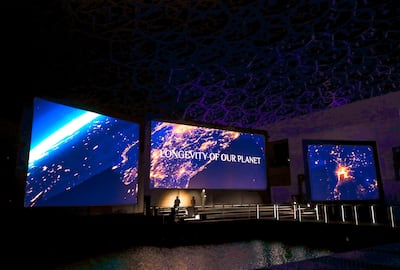A UAE medical group is looking to cutting edge science to help people live longer than they do today — with a target of 101 years for all.
Pure Health wants to make the capital a centre of research on longevity, its chief executive Farhan Malik told an event at Louvre Abu Dhabi on Monday night.
“When we talk about longevity, we don't just mean increasing lifespan but making people healthier for longer,” he said.
The company's new focus is the science of “unlocking time”, which has emerged as a multibillion dollar industry in the past decade.
chief executive, Pure Health
He said the goal would be to "extend life from an average of 76 years to 101".
The theory behind longevity biotechnology is that medicines, lifestyle changes, early intervention and coaching would allow a person to live far longer than they do today.
For an audience of senior government officials and medical figures, Mr Malik and Pure Health's chief operating officer Shaista Asif set out how a young Emirati today might live longer.
How someone could live to 101
“Ahmed” moves from childhood to adulthood with regular check-ups, and doctors use a “digital twin” to track how his body and mind could be optimised.
He has eye strain and sleeps poorly at times but is at a healthy weight, at 56kg by age 14, and has a positive mood in general.
Later in life his develops cancer, loses his hair and is involved in a major road accident that damages his heart — but he survives.
After the car crash, bioprinting is used to create a new heart for him.
At various stages, doctors use a dashboard to look at how he can be helped to recover and live longer. A “digital twin” is used to try out medication and test different scenarios for the best outcomes, rather than trial and error.

At one point, the dashboard's “smart life coach” detects that Ahmed is depressed and puts him in touch with a therapist.
Despite his health ordeals, Ahmed goes on to live to be a 101.
“That's our gold star — to make this country the land of opportunity where people from across the globe migrate into this beautiful setting to live longer, healthier, happier lives,” said Ms Asif.
“To give you the possibilities you dream of, to give you the memories you want to create, to give you the opportunities you want to explore.”
Where to start
If individual hospitals and doctors “work in isolation”, as is the case in many healthcare systems, such outcomes would not be possible, she said.
Mr Malik said a recent deal with the Department of Health Abu Dhabi, to create a centralised health platform where all data comes to one platform, was an example of where such a system begins.
“All the data lakes from Abu Dhabi will come to one platform so that all our businesses are working towards … one location for more accurate and more personalised medicine,” he said.
“Healthcare is a human right for everybody. It should not be for the one who has a monetary dollar value in their hand. Just like education should be democratised, housing or shelter democratised … health care has to be available for everybody.”
Pure Health became the UAE's largest medical group when Abu Dhabi Health Services Company, better known as Seha, which ran the capital's public hospitals, and the National Health Insurance Company, better known as Daman, merged with it.
The holding company and wealth fund ADQ is the largest shareholder. ADQ also merged its healthcare entities Rafed and Union71 with Pure Health last year.
Pure Health now owns 28 hospitals, 100 clinics and more than 160 laboratories across the UAE.
Over the past decade, billions of dollars have been invested in anti-ageing research, with Google's Calico, American entity the National Institute on Ageing and Saudi Arabia's Hevolution some of the names in the industry.
Although wonder drugs such as Metformin, Aspirin, Rapamycin have all been touted as bringing about longer lives, the sector remains in its infancy.





